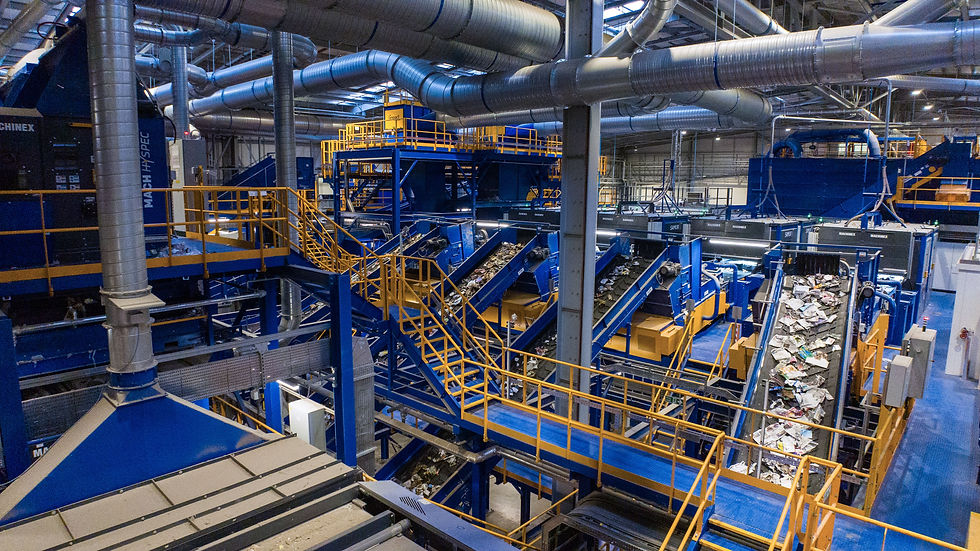Commingled flexible plastic collections possible, finds FlexCollect report
- Susan
- Sep 3, 2025
- 3 min read
The FlexCollect report, a comprehensive paper spearheaded by EcoSurety detailing key findings from the UK’s biggest flexible plastic kerbside recycling collection project, has found that commingled flexible plastic collections are achievable, if infrastructure is correctly invested in.
With mandatory kerbside collections set to be rolled out from 2027, a key objective of the programme was to help local authorities, packaging producers, policy makers and the wider plastics value chain better understand consumer behaviours and be armed to tackle common barriers. As part of the initiative, collection trials were undertaken across nine different waste collection authorities over a three year period.
The major takeout from the report was the conclusion that flexible plastic packaging can be effectively and practically incorporated into existing collection systems and infrastructure, with minimal disruption to authorities or operators. Detailed modelling work identified that the provision of a collection bag, filled and placed inside (or next to) an existing recycling container, would prove a robust and efficient solution to capture flexible plastic packaging without requiring additional crew or amended rounds.
In the long term, data included in the report from Sherbourne Recycling’s materials recycling facility (MRF) in Coventry suggested that fully commingled processing of flexible plastic packaging, loose with other dry mixed recycling (DMR), is possible with sufficient investment in sorting infrastructure.

Greg Paradowski, technical and operations director at Sherbourne Recycling, said: ‘The FlexCollect project was a significant piece of work and it is a real privilege to have contributed so impactfully to the resulting report alongside our partner authority, Warwick District Council, which played a vital role. As one of the world’s most advanced MRFs, our site was used as part of the trial programme, specifically to identify baseline data for flexible plastic recovery in commingled collections.
‘We harness the very latest in AI and robotics equipment to separate material to a more intricate degree than many other operational sites in Europe. While our line hadn’t necessarily been fully optimised to separate flexible plastic during the trial, we demonstrated the real world capability of advanced sorting infrastructure.
‘Indeed, our data was highlighted within the report as a demonstration of both current and future potential. With no modifications needed (such as additional bays or picking resources), our site validated the idea that the fully comingled processing of loose flexible plastic packaging is perfectly possible with the right investment and design.
‘Even more interestingly, since the trial in 2024, our sorting accuracy has increased, and the capture rate ceiling is far higher than the initial results, giving us a great baseline on which to improve further. We have already been able to refine our calibration and improve our precision, thanks to the flexibility and adaptability of the plant. This means that, for householders within the local authorities we handle recycling from, their flexible plastics can be separated from a comingled recycling bin, a service we have launched already to six of the eight partner councils well ahead of 2027 policy implementation.
‘While it is fair to suggest that we are probably the only site in the UK capable of delivering results anywhere close to these levels, it is positive to see that the future of waste management can rely on technology, rather than consumers having to separate at source – a far more reliable long term solution.
‘As the UK edges ever closer to new guidance around flexible plastics, driven in the main by Simpler Recycling legislation, a solution clearly exists to successfully capture material for recycling. For much of the UK’s existing recycling infrastructure, collecting flexible plastics in separate bags is absolutely the easiest and most cost effective solution. In the future, however, as more MRFs begin to invest in truly state of the art technologies, it is clear to see that optimal results can be achieved.
‘From a consumer engagement perspective, this is obviously the preference. As an industry, our goal must be to eliminate any complexity and confusion of kerbside recycling. This will prove instrumental in driving further recycling improvements and accelerating national progress towards a more circular packaging economy. From a local authority budget perspective, this would also reduce costs in the long term. A win-win situation.’






Comments